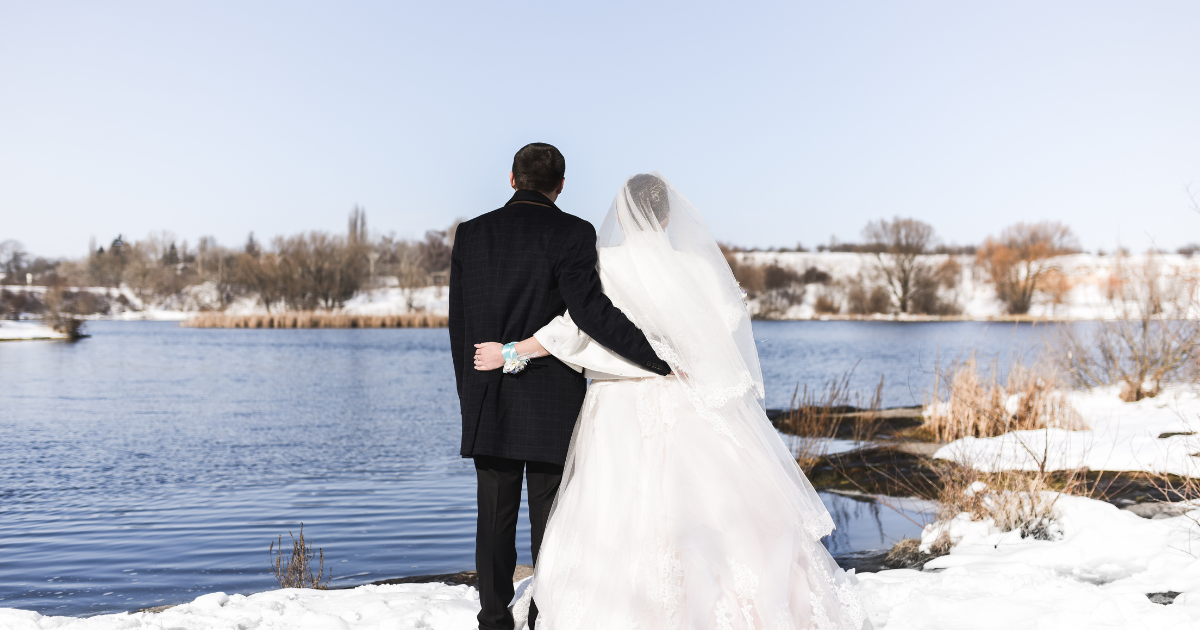You’ve probably had a long-held vision of what your wedding will look like…
We’re betting however, that you may not have imagined, let alone decided on a date. There are lots of different things to consider before you arrive at a date. Your selection will dictate things such as your guests’ ability to attend down to the overall vibe of your celebration. There are external factors too that you don’t have control of such as the venue availability, that make choosing the date a little trickier. In this blog post we’ll walk you through some considerations for setting your ideal wedding date, ensuring that your big day is everything you’ve dreamed of and more.
Personal Significance
When setting your wedding date, consider dates that hold some personal significance for you and your partner. It could be the anniversary of when you first met, your engagement date, or a date with sentimental value to your relationship. These dates often have a special meaning and can add a layer of significance to your wedding day.
You could also choose a date significant to your family, such as your grandparents’ wedding or another important event.
Tips:
– Reflect on your relationship milestones and significant dates.
– Discuss with your partner any dates that feel particularly meaningful.
– Ensure these dates don’t clash with personal commitments.

Seasonal Preferences
The season in which you get married will set the tone and vibe for your wedding. Each season brings its own unique atmosphere, which will impact everything from the colour palette and venue decor to your attire and even the food menu.
Spring (March-May):
– Pros: Blooming flowers, moderate temperatures, and a sense of renewal.
– Cons: Unpredictable weather and shoulder wedding season mean slightly higher costs.
Summer (June-August):
– Pros: Longer days, warm weather, and outdoor venue options.
– Cons: Warmer temperatures, higher chance of conflicts with guests’ vacations, and higher supplier prices. Peak season – highest cost for venues.

Autumn (September-November):
– Pros: Beautiful fall foliage, mild temperatures, and cosy ambience.
– Cons: Shorter days, unpredictable weather, and prices are still reasonably high, as it’s the next most popular season after summer.
Winter (December-February):
– Pros: Unique winter wonderland theme, off-peak season with potential cost savings, and holiday charms like twinkling lights and Christmas trees.
– Cons: Cold weather, potential for high flight costs at Christmas and travel disruptions; limited daylight.

Venue Availability
Your dream venue might have limited availability, especially during popular wedding seasons. If you have a specific venue in mind, you must be flexible with your dates. Contact your top venue choices early in planning to check their availability.
Tips:
– Make a list of your preferred venues and check their calendars.
– Consider off-peak dates or weekdays for more availability and potential cost savings.
– Book your venue as soon as possible to secure your desired date.

Guest Considerations
Your wedding date should accommodate the schedules of your most important guests. Consider any significant events or holidays that might conflict with your chosen date. Additionally, think about the travel plans of out-of-town guests.
Tips:
– Send out save-the-dates well in advance to ensure guests can make arrangements.
– Avoid major holidays and busy travel periods.
– Consider your guests’ schedules, such as school vacations or work commitments.

Budget Constraints
Your budget can significantly influence your wedding date. Peak wedding seasons often come with higher costs for venues, vendors, and accommodations. If budget is a concern, consider off-peak seasons or less popular days of the week.
Tips:
– Research the cost differences between peak and off-peak dates.
– Look for special offers or discounts for off-season weddings.
– Balance your desired date with your overall budget to avoid financial stress.
Weather Conditions
Weather can play a big role in your wedding day experience, especially when planning an outdoor ceremony or reception. Research the typical weather patterns for your preferred dates and locations to ensure you’re prepared for any conditions.
Tips:
– Check historical weather data for your chosen location and date.
– Have a backup plan in case of bad weather, such as a tent or indoor option.
– Consider the comfort of your guests in extreme weather conditions.

Suppliers Availability
Popular vendors, such as photographers, bands and florists, can book quickly, especially during peak wedding seasons. If you have specific vendors you want to work with, their availability might influence your wedding date.
Tips:
– Make a list of your must-have vendors and check their availability.
– Book your vendors as early as possible to secure your preferred date.
– Be flexible with your date if your heart is set on specific vendors.

Holiday Considerations
While holiday weddings can be great, they can also pose challenges. Major holidays might affect venue and vendor availability, guest attendance, and overall costs.
Pros of Holiday Weddings:
– Built-in themes and decor (e.g., Christmas lights, New Year’s Eve fireworks).
– Easier for guests to take time off work.
– A festive and celebratory atmosphere.
Cons of Holiday Weddings:
– Higher costs due to peak demand.
– Potential conflicts with guests’ existing holiday plans.
– Limited availability of venues and vendors.
Tips:
– Weigh the pros and cons of a holiday wedding.
– Communicate with key guests to ensure their availability.
– Plan early to secure your preferred venues and vendors.

Day of the Week
While Saturday is the most popular day for weddings, it’s not the only option. Each day of the week has its own advantages and challenges.
Friday:
– Pros: Lower costs, more venue availability, a full weekend to celebrate.
– Cons: Guests may need to take time off work for shorter preparation time.
Saturday:
– Pros: Most convenient for guests, more accessible to plan a full day of events.
– Cons: Higher costs, limited availability, and potential scheduling conflicts.
Sunday:
– Pros: Lower costs and more availability, ideal for a relaxed, daytime wedding.
– Cons: Guests may need to leave early for work the next day, less time to celebrate.
Weekdays (Monday-Thursday):
– Pros: Significant cost savings and high availability of venues and vendors.
– Cons: Guests may need to take time off work, lower attendance.
Astrological and Numerological Beliefs
For those who value astrology or numerology, the alignment of the stars or the significance of numbers can play a role in choosing a wedding date.
Tips:
– Consult an astrologer or numerologist for auspicious dates.
– Consider the compatibility of the date with your zodiac signs.
– Use numerology to find a date with positive significance.

Sentimental Locations
If a specific location holds sentimental value, such as where you first met or got engaged, this can influence your wedding date. Certain locations might be more beautiful or accessible during specific times of the year.
Tips:
– Consider the best time of year for your chosen location.
– Check the availability and cost of the location during different seasons.
– Plan for any potential travel arrangements for you and your guests.
Length of Engagement
The length of your engagement can affect your wedding date choice. Some couples prefer a more extended engagement to allow more time for planning, while others may want a shorter engagement to get to the altar sooner.
Tips:
– Assess how much time you’ll need to plan your wedding comfortably.
– Consider your personal timeline and any major life events.
– Balance the desire for a memorable date with practical planning needs.
Choosing your ideal wedding date involves balancing personal preferences, practical considerations, and sometimes a bit of compromise. Remember, there’s no one-size-fits-all answer to selecting the perfect wedding date. Most importantly, your chosen date feels suitable for you and your partner. Check out our Planning section for more wonderful ideas that might help you in your wedding planning!






